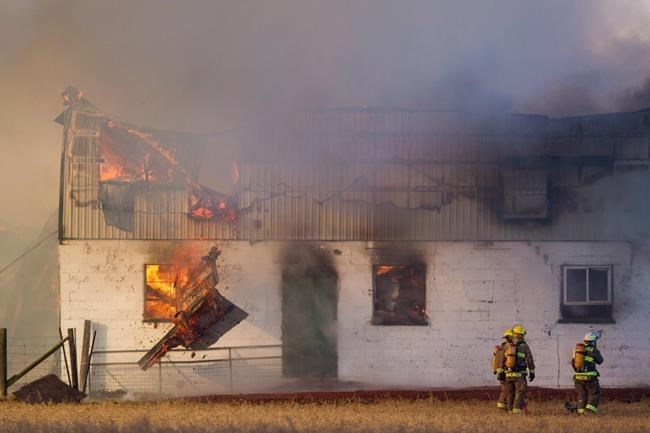Better fire protection is needed in barns to stop the cruel deaths of tens of thousands of farm animals each year, says a report from the Humane Society International/Canada.
"We're just not realizing how big an issue this is and how many people it impacts," Riana Topan, who helped write the report, said Tuesday.
The humane society has combed through media reports and the few government sources available and estimates that at least 750,000 animals have died in barn fires since 2015. That number is likely to be low.
"Media reports are documenting only a fraction of the barn fire incidents that happen throughout Canada," the study says.
Nearly three-quarters of the dead animals were chickens. Except for 2019, every year in the study period had at least one fire that killed more than 30,000 hens, roosters and chicks.
Pigs made up another 15 per cent of deaths. The numbers for cows were low, but they were involved in more than half of all barn fires, which killed 21 different species during the study period.
In Ontario, 39 farmers were injured trying to save their animals.
"There are numerous media interviews with farmers, their neighbours, members of their communities and firefighters that (recount) the screams and cries they heard from cows or pigs trapped inside burning buildings," the report says. "The screams can last for hours."
The economic loss is estimated to be at least $165 million.
Topan said changes are needed to Canada's national building code, now being revised by the National Research Council. A new code is expected later this year.
"We should see a distinction between different types of property," Topan said. "Buildings that house animals should be treated separately from buildings that house objects."
Sprinkler systems, on-site water storage and heat and smoke detection should all be considered, she said.
The society also endorses recommendations from the Ontario government, which include isolating electrical equipment — the cause of more than half of barn fires — from the rest of the structure.
Farmers recognize fires are a problem, said Gary Stordy of the Canadian Pork Council.
"It is a concern. It is the livelihood of the producer and it also impacts mental health."
Stordy warns that solutions developed in cities may not work on farms. Sprinklers or pumps, for example, are useless if the power they depend on is gone.
"That's usually the first thing to be shut off," Stordy said.
"(Sprinklers) are something that's been looked into, but it has to be a practical investment."
Stordy added that fire suppression systems still wouldn't help farmers manage several hundred frightened and possibly injured animals, at various stages of growth, whose first instinct would be to head back into a burning barn.
The council emphasizes regular inspection and maintenance of electrical equipment or periodic surveys for hot spots.
"Prevention is the ideal key."
The national building code is revised every five years. Its implementation is up to the provinces.
The National Research Council's time period for public comment on changes to the code closes at the end of this week.
This report by The Canadian Press was first published March 9, 2020.
— Follow @row1960 on Twitter
Bob Weber, The Canadian Press
Note to readers: This is a corrected story. An earlier version referred to the Humane Society of Canada.



